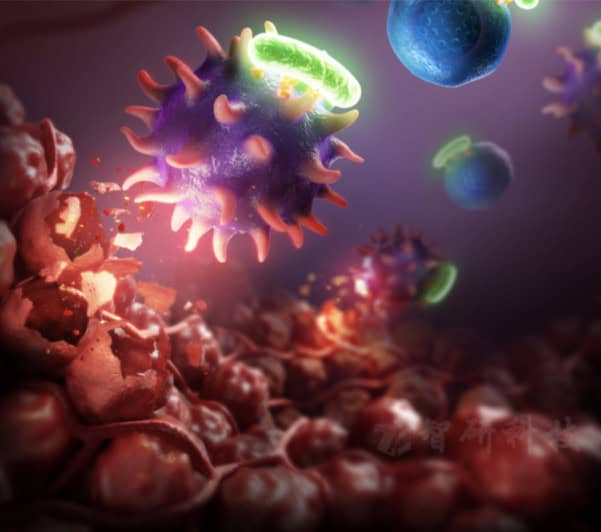
Harnessing Gut Bacteria to Combat Cancer: Innovations in Tumor-Targeted Immunotherapy
A team of researchers has examined a promising new approach, which uses engineered non-pathogenic bacteria to enhance the body’s immune response against tumors.

A team of researchers has examined a promising new approach, which uses engineered non-pathogenic bacteria to enhance the body’s immune response against tumors.
Advancements in cancer immunotherapy have provided hope for many patients with advanced malignancies. However, a substantial challenge remains in effectively treating these conditions. A collaboration among Dana-Farber Cancer Institute, Northeastern University and the University of Michigan has been researching innovative approaches to address these issues.
A team of researchers, including Jiahe Li, U-M Assistant Professor, Biomedical Engineering, and Rizwan Romee, Associate Professor, Dana-Farber Cancer Institute, have examined this promising new approach, which uses engineered non-pathogenic bacteria to enhance the body’s immune response against tumors. Shaobo Yang and Dr. Michal Sheffer are the lead authors of the paper published online at Nature Biotechnology. Li and Romee are co-senior authors for the study.

Understanding the Challenge:
Dr. Li explains, “The tumor microenvironment (TME) can inhibit the efficacy of cancer therapies through mechanisms such as poor trafficking and exhaustion of immune cells. This is a significant hurdle in treating cancers, especially those that have advanced and metastasized.”
Researchers globally have been working with various immunotherapeutic strategies, including immune checkpoint blockades, chimeric antigen receptor (CAR) T, and CAR Natural Killer cells, but these often fail due to the highly suppressive nature of the TME. Dr. Romee adds, “this is particularly a problem in solid tumors like advanced colon cancer and pancreatic cancer where we have failed to make significant progress.”
The Innovative Solution:
“Our approach is to use bacteria that are originally found in the human gut, and then genetically modify them to have anti-cancer activities,” Dr. Li said. “These bacteria, with their innate ability to colonize hypoxic tumor tissues, can be a powerful vehicle to deliver cancer-fighting agents directly to the tumor site.”
Using non-pathogenic Escherichia coli (E. coli) K-12 DH5a, a safe strain originally derived from the human gut, the researchers engineered these bacteria to display immune-activating molecules on their outer membrane. This method was chosen to overcome the limitations of traditional bacteria-based therapies, which rely on bacterial secretion, or lysis, to release therapeutic payloads – often resulting in limited efficacy.
Effective in Mouse Models:
In tumor-bearing mouse models, particularly those with colorectal carcinoma and melanoma, the engineered bacteria expressing decoy-resistant IL18 mutein (DR18) induced potent immune responses. The results were promising, showing significant suppression of tumor growth and prolongation of survival in these models.
“Our live bacteria-based system not only targeted the primary tumor effectively but also helped in preventing the spread of the cancer to other parts of the body,” said Dr. Li. This dual capability is similar to the way vaccines work by priming the immune system, but instead of preventing future infections, this process fights existing tumors.
“Furthermore, these bacteria did not cause any major side effects in both immunocompetent and the mice which were highly immunocompromised highlighting the safety of this approach in future clinical trials in patients,” said Dr. Romee.
Collaboration and Future Potential:
Jiahe Li’s U-M work, in collaboration with the Dana-Farber Cancer Institute and Northeastern University, highlights the potential of engineered gut bacteria in enhancing CAR NK cell therapies. “What’s novel here is combining engineered bacteria with chimeric antigen receptor technology that reprograms immune cells to recognize and attack tumors. This combination therapy showed enhanced tumor targeting and immune activation in our studies.”
Looking ahead, Dr. Li is optimistic about one day translating these findings to clinical settings. “Our approach mimics how vaccines boost immune memory but in reverse. Instead of a preventative measure, it serves as a therapeutic strategy to enhance the body’s ability to fight cancer once it’s present.”
The promising results from mouse models provide a strong foundation for further evaluation and potential clinical trials in humans.